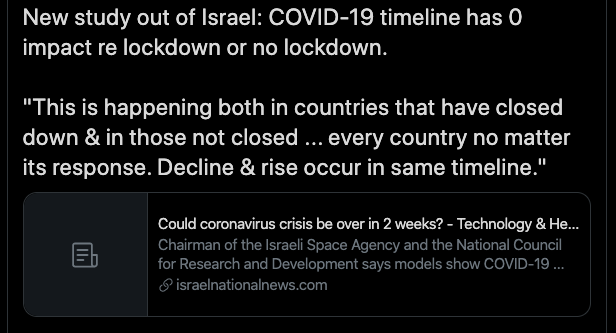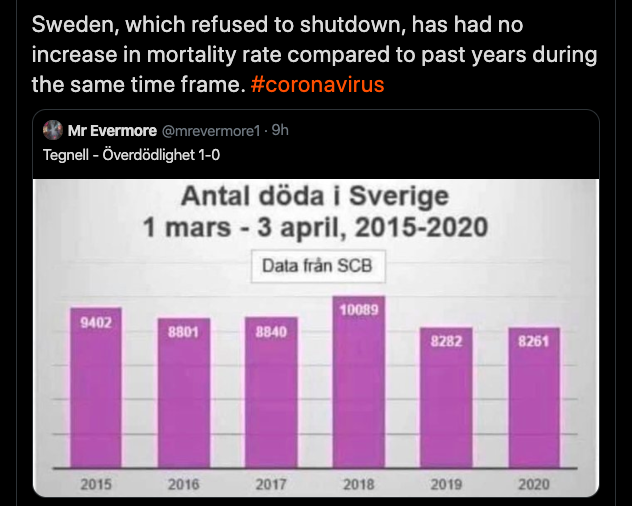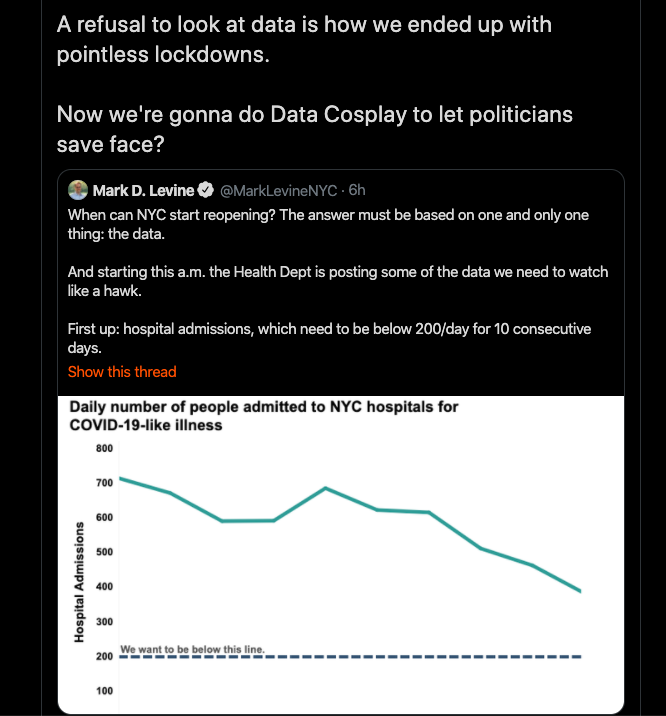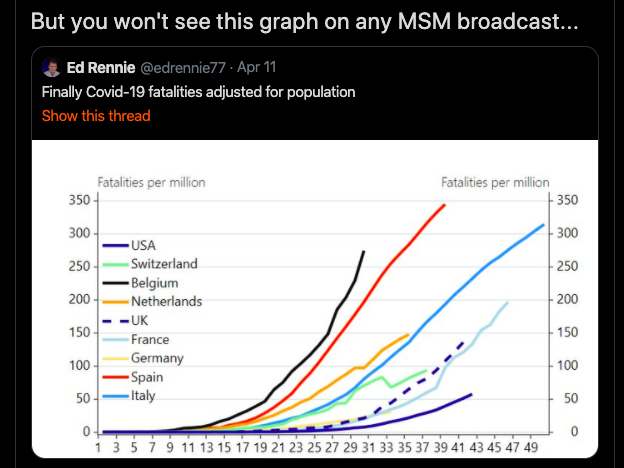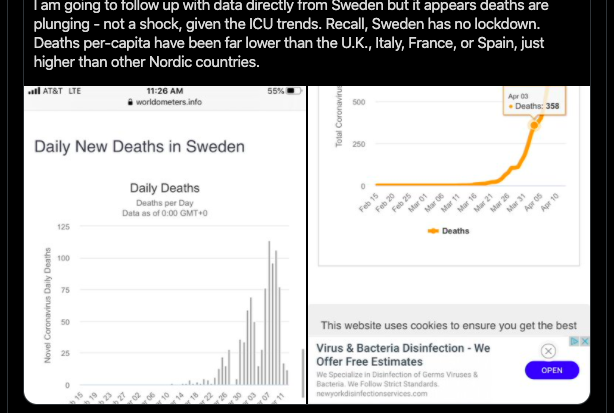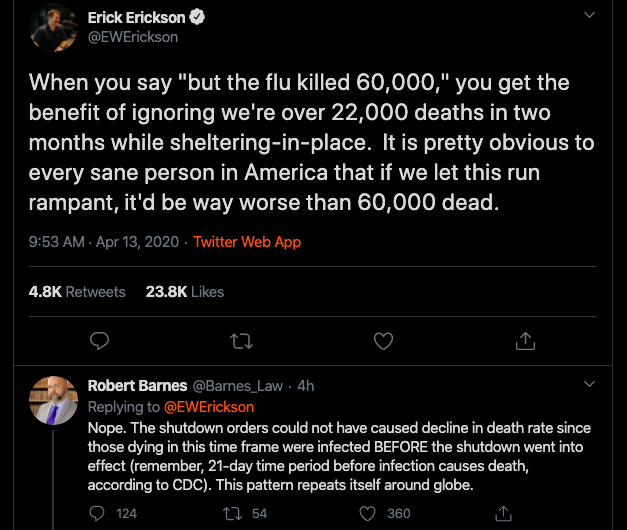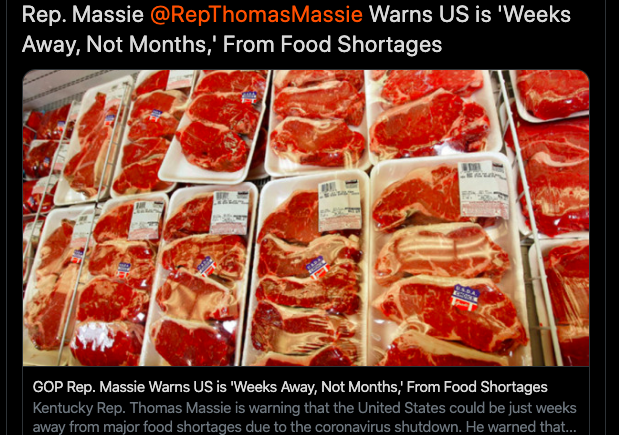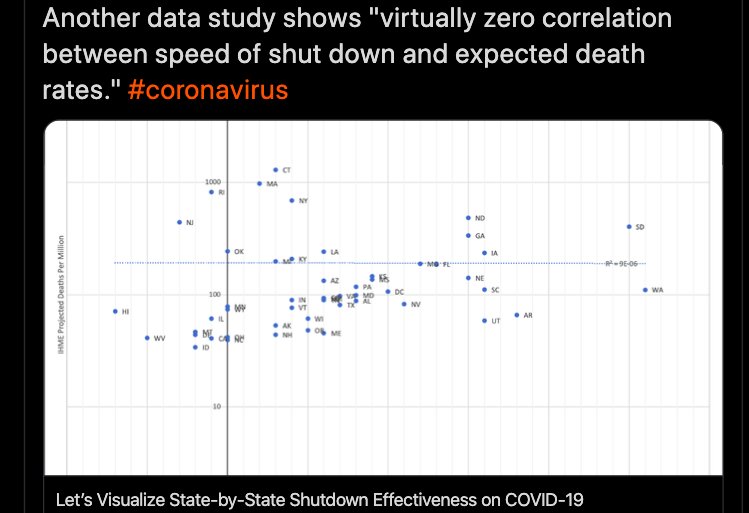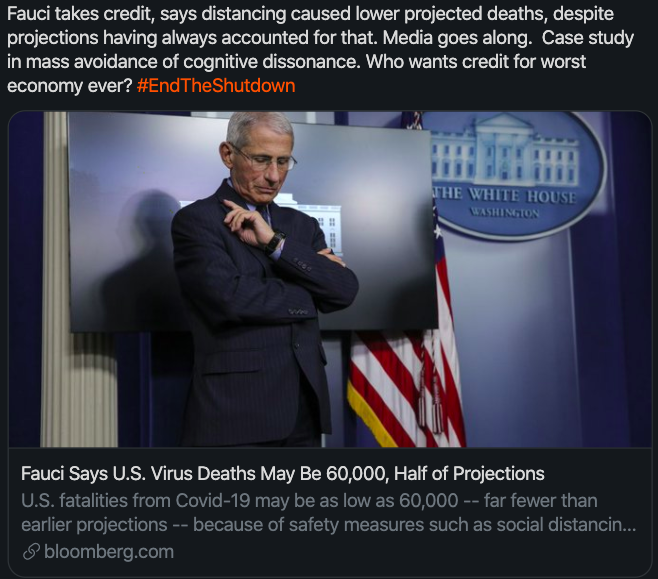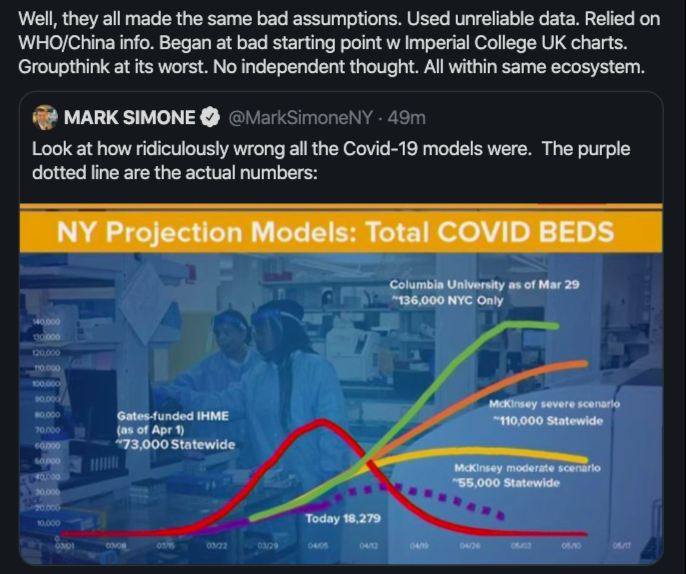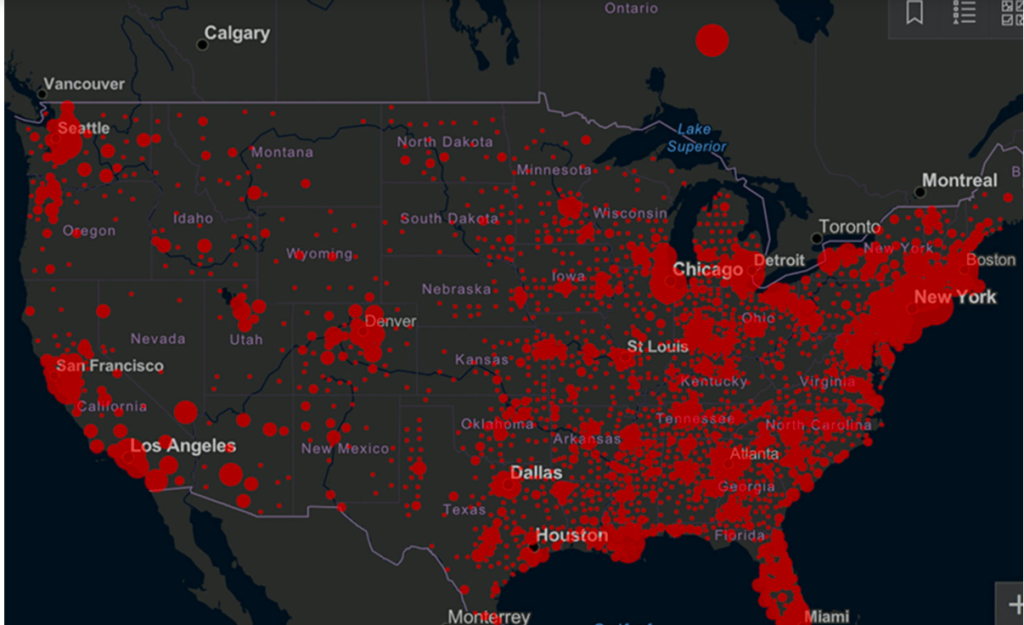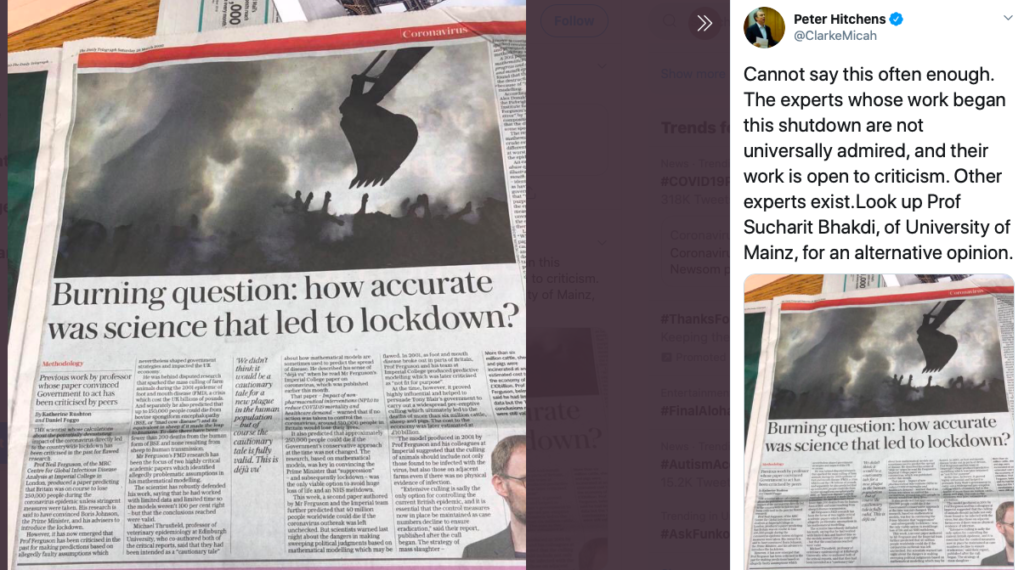“Emergencies” have always been the pretext on which the safeguards of individual liberty have eroded.
— Friedrich Hayek
During seasons of great pestilence men have often believed the prophecies of crazed fanatics, that the end of the world was coming. Credulity is always greatest in times of calamity.
— Extraordinary Popular Delusions and the Madness of Crowds, Charles MacKay
Something you should know at the outset, if you don’t know it already:
“The latest figures on overall death rates from all causes show no increase at all. Deaths are lower now than in 2019, 2018, 2017 and 2015, slightly higher than in 2016. Any upward bias is imparted by population growth” (source).
Bill Gates, whose political-economic philosophy is an unintegrated farrago of hackneyed shibboleths, recently said this: “Normalcy will only return when we’ve vaccinated the entire global population. The economic hit [will be huge] but we don’t have a choice.”
He is flatly, unequivocally wrong.
As is the elitist tool Dr. Ezekiel Emanuel, who was the main architect of the Obamacare debacle (yes, the same man caught on video advocating actual death-panels for the elderly [watch that video, please]), who recently called for a mandatory 18-month lockdown, and who also recently said this:
“How are people supposed to find work if this goes on in some form for a year and a half? Is all that economic pain worth trying to stop COVID-19? The truth is we have no choice.”
Reader, we have a choice.
I repeat: we have a choice.
We have a choice, and that choice is the correct choice, and it is the one that should be chosen precisely because it’s the right one.
I want you to please notice first and foremost the sloppy logical-fallacy — called a false dilemma fallacy — pathetically smuggled in by both of these clownish charlatans who would dare to presume to make decisions for the rest of us: either we shut down the economy for many months to come and live as slaves to an elite bureau of central planners, or we do nothing.
You either support the lockdowns, in other words, or you want everyone to die.
You know what you do with that sort of obvious tactic — that sloppy pathetic attempt at argumentation?
This: you swat that strawman into oblivion and then you crush it into the dirt with the heel of your boot, and you tell these elitist tools that neither they nor anyone else, even the most elite bureau of planners imaginable, has rightful jurisdiction over your person or property.
I do sincerely believe that one of the primary reasons people buy into such ridiculous nonsense is that people simply cannot imagine that ostensibly educated human beings, like scientists, doctors, lawyers, computer scientists and so on, could be so stupidly naïve and ignorant concerning such basic things. It is therefore often concluded that these people must be right.
I want to assure you that educated people of all varieties — even the most highly educated — not only can be so stupidly naïve and ignorant: they are frequently so. It happens, in many cases, more often than not, I believe — especially concerning political-economic philosophy because postmodern leftist-progressive Neo-Marxist theory, in one form or another (and they’re all preposterously antiquated and have been proven wrong time and again), dominates academia around the globe, and has for many decades. Millions and millions of nominally educated people are thus inculcated up to the gills with this poisonous doctrine — this mathematically impossible economic theory of forced egalitarianism and altruism at the point of gun — and the overwhelming majority of these millions can’t even see that they’ve been inculcated with it, let alone break out of it.
This is also a testament to the fundamental importance of thinking about and establishing the philosophical principles which undergird all subsequent knowledge — a testament as well to the widespread practice of tendentious reasoning and confirmation bias.
Please be assured of the following, if nothing else: a great many secular beliefs held even by successful and seemingly intelligent people are every bit as dangerous and dogmatic as the fanatical non-secular beliefs that get so much more attention, and if you doubt me at all, then don’t click this link.
What so many of these nominally educated people fail to grasp is the boundless possibilities which arise naturally from voluntary action, non-coercive adjustments, and human intelligence when left free of force — both by individuals acting with free agency and by businesses run by such individuals.
I’m well-aware that the books and essays against my position are endless and some even have the appearance of sophistication, the superficial veneer of something cogent. Some are award-winning and even sound closely reasoned. But essays on this subject get nowhere except back where they all began:
Do individuals possess the right to their own person and property, or not?
The fact is that there is no conflict between humanitarian and economic concerns.
It’s another false dilemma the world has presented you. I promise you it’s wrong.
A poorer country or society is always much less healthy and more vulnerable to illness, disease, pollution, and every other deleterious thing.
“When human societies lose their freedom, it’s not usually because tyrants have taken it away. It’s usually because people willingly surrender their freedom in return for protection against some external threat” — said former UK Supreme Court Justice Jonathan Sumption. He called this “herding behavior” and said that herding behavior is precisely why “hysteria is infectious.”
You will not see a greater illustration of this fact than you’re seeing play out right now across the entire world.
Try this:
If you were handed two cards with lines on each, one clearly shorter than the other, could you tell the difference? If you think this is a ridiculous question, think again.
In one of psychology’s most famous experiments, Solomon Asch showed that if you’re in a group and most of the group members claim the shorter line is longer, you might just go along. In his book You Are Not So Smart, David McRaney reports, “In Asch’s experiments, 75 percent of the subjects caved in on at least one question [about the length of the lines]. They looked at the lines, knew the answer everyone else was agreeing to was wrong, and went with it anyway.”
Perhaps even worse, those who changed their correct answers to conform with others “seemed oblivious to their own conformity. When the experimenter told them they had made an error, they came up with excuses as to why they made mistakes instead of blaming the others.”
If you’re sure you would go against the grain, consider this: “The percentage of people who conformed grew proportionally with the number of people who joined in consensus against them.”
Imagine you are in a meeting, and a significant decision is to be made. You think your manager’s plan is ditzy. You are ready to speak out when you see everyone else in the meeting is agreeing with your manager. Would you behave like a mouse and go along? If you’ve ever gone along with a poor decision, don’t beat up on yourself; it’s tough to go against the herd.
Perhaps you think Asch’s experiments merely show there is no reason to dispute the crowd when the situation is trivial. Sadly, research shows when something significant is on the line, fewer people will buck the herd.
In his book The Science of Fear, Dan Gardner reports on experiments by psychologists Robert Baron, Joseph Vandello, and Bethany Brunsman which found that conformity goes up “so long as the judgments are difficult or ambiguous, and the influencing agents are united and confident.”
Gardner wondered, would new evidence “make us doubt our opinions?” The answer, Gardner found, is “Once we have formed a view, we embrace information that supports that view while ignoring, rejecting, or harshly scrutinizing information that casts doubt on it.” [My red emphasis.]
The latest evidence suggests COVID-19 is not as high a risk as initially thought. If you think such evidence will convince your neighbors or Facebook friends that it’s time to end the lockdowns, you will be endlessly frustrated. Our neighbors care what other people think. If you live in an area where support for the lockdowns is widespread, your neighbor will likely go along. Remember, the more nuanced an issue is, and the more critical the problem, the more the desire to conform goes up.
We are living through both a pandemic and a contagious madness of global proportions.
Politicians who led us down this destructive lockdown path won’t be changing their view until their “solution” is politically untenable.
(Link)
In 1850, the French economist Frédéric Bastiat aided the world in understanding “the seen and unseen costs” of authoritarian policies. What Bastiat was referring to is the fact that it’s simple to see how (for instance) the state giving millions of people a $5000.00 check will buy them groceries and pay rent. But it’s not so simple or obvious — and yet even more critical — to see the costs and harms of where such money must come from: the escalation of borrowing and taxation, the trillions in pointless spending that accumulate, the unprecedented amounts of new money created by the Federal Reserve, the ensuing inflation, which is a form of theft on people’s life-savings, and the countless other destructive ramifications and repercussions, which mushroom endlessly because in trying to fix the initial problems that the unseen costs create, more controls are levied and then more unseen costs accrue.
Yet the masses (i.e. the voters), unwilling to even consider the possibility of unseen costs, cheer for it because in their eyes government can magically create money from whole cloth.
Ladies, gentleman, and everyone else — please hear me: it is naïve to think that people won’t adapt to a threat, real or perceived. It’s equally naive to think that businesses won’t either — including shutting their doors, if they deem it most prudent, or if the customers determine it by their voluntarily deciding not to go out for drinks or food, entertainment or recreation, because they have concerns about the health and safety of themselves and their family — just as people already were doing without needing a government mandate; just as businesses deemed “essential” already have and just as businesses deemed “non-essential” already were before state-forced lockdown made it illegal.
The more you treat human beings like helpless babies, the more human beings will expect to be treated this way — and therefore the greater the growing dependency on that monstrous leviathan known as the state, which is by definition an agency of force and as such cannot spend a single penny unless it first either taxes, borrows, or prints: until in a very short time, there is no end to the things that people, even once self-reliant people, come to expect the state (rather than voluntary transactions and peaceful exchanges among humans) to provide for everyone — all in exchange for your and my inalienable right to life and property, and that of course includes the limitless ingenuity and progress and health and wealth and civilization brought about by conditions of freedom and the protection of our inalienable rights.
There is a very specific reason that all societies governed predominantly by authoritarian states exist in widespread poverty and complete suppression of the individual’s rights, as there is a precise reason that all societies governed by a predominately laissez-faire state have, exactly to that extent, flourished and freed the individual.
Freedom once gone is gone forever.
This is why you MUSTMUSTMUST stand up against this unprecedented power-grab, and the propaganda campaign that largely fueled it. Even if you’re perfectly okay with the state now having this kind of power over this particular thing, realize there is no longer any check on it: it was decreed by executive order, and that power is automatically unchecked, and horribly dangerous. Think of that unchecked power turning, for no reason or just cause, against something (or someone) you hold dear — because I promise you that it is only a matter of time before this unleashed power-source spreads into other areas. Power and bureaucracy once established are impossible to retrogress away from, and there is already a growing chorus of voices calling for no return to normal — which was hardly laissez-faire anyway, though much closer than this current cataclysm.
There is the threat of a virus, and this virus and the destruction caused by it are real and should never be taken lightly, but rather with measured and serious precautions — precautions which a free society with a free people rationally informed (by, for instance, the testing kits that the CDC bureau made illegal in favor of their own broken junk) are best equipped to handle — just as we should take seriously any influenza or other potential epidemic.
The dangers should not, however, be overblown, and neither should we be lied to, nor yanked around like puppets by bureaucratic puppet-masters who are philosophically bankrupt, so that the “cure” creates greater destruction (by far) than the disease. There has unquestionably been fear-mongering and outright prevarications, and it is an outrage and, in my opinion, a total scandal which, in the name of science and scientific integrity, should be prosecuted to the full extent of the law that Neil Ferguson, the corrupt scientist largely responsible for the onset of this hysteria proper, still refuses to show anyone his thirteen-year-old computer code which he used to make his outlandish predictions about Covid-19. There has been a definite propaganda-machine behind much of the catastrophizing — a machine promoting misinformation, exaggeration, hysteria, and panic, and there has unquestionably been a huge governmental power-play as a result of that machine and the fear it thereby spawned and which the majority of people are permitting in total acquiescence to the whipped-up fear. Not even the New York Times, once the most admired and venerable newspaper in the United States, if not the world, now denies this — in large measure because they, too, bought into it.
There’s no end to the emergencies and crises that power-lusting politicians and bureaucrats, with their unslakable cupidity, are capable of generating — all of which to the detriment of individual rights: whether the crisis is environmental, terroristic, proletarian, pandemic, privilege, labor, geo-political, racial, religious, or any others, both known as well as the yet-to-be-conceived, or any cross-combination. The forces that work tirelessly against individual rights are legion and multiplex, and they are constant because, like virus, they can’t survive exposure to light, and they thus mutate from year-to-year, decade-to-decade, generation-to-generation: God-or-Devil-appointed kings and queens one generation, Monarchy the next; Marxism one generation, Socialism on the NAZI pattern next; Neo-Marxism one generation, environmentalism the decade following — right after the fall of the Berlin Wall and the subsequent implosion of the Soviet Union; deep ecology one decade, inequality the next; privilege one year and then the year following, democratic socialism is all the rage. And so it goes. One generation plagiarizes another. The only thing different about them are the concretes: the principles remain precisely the same.
Quoting from a good article, with slightly confusing grammar and punctuation, by a writer named John Tamny:
It cannot be stressed enough that the political response to a virus, one that has broadly limited freedom with our “own good” in mind, has amounted to an obnoxious non sequitur. Death potentially looms due to an unknown, so restrain the very human capital that has felled all manner of past maladies with economic growth, creativity, and advances born of growth capital matched with the creative?
The lack of freedom that so many say is the coronavirus solution is in truth what blinds us to a solution. There’s so much we don’t know, and one reason we don’t is because there are too many rules, and too many not allowed by decree to produce information about the implications of people freely moving about and interacting.
That it took only the suggestion of the possibility of sickness, with an approximately estimated one percent lethality (and it is almost certainly lower), to render a nation once characterized by individuality, autonomy, freedom, innovation, creativity, industriousness, hard work, industry, and more into housebound conformists — it completely confirms what some non-conforming commentators have suggested: this is the most mind-spinning consolidation in the shortest span of time of millions and millions willingly acquiescing individual liberty to full power that you will ever see played out in real time. And I agree.
“It’s possible to believe that Covid-19 is potentially as lethal (or more) than even the highest estimates, contagion rates high or higher than estimates, and social distancing wise, while also believing that current government polices are misguided and tyrannical. They’re not mutually exclusive views.”
— Peter Earl, economist
Please consider what I already said above: the power which the state has seized by executive decree is a newfound power that’s unchecked, and even if you agree wholeheartedly with the motive and desired results of this particular power-play, remember the following and think about it carefully: it is an unjustly acquired state power over individuals and their property, yours included, and all your loved ones’ as well, and because it’s unchecked, it is a power that can now move in any direction, into any arena of human life.


